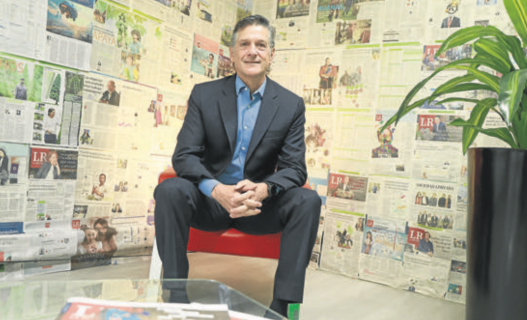
WE ARE EVALUATING POSSIBILITIES TO HAVE OUR OWN PRODUCTION IN EUROPE': ALPINA GROUP PRESIDENT
By Sofía Alexandra Duarte Torres / La República
Although the Colombian food sector was hit by inflation last year, Grupo Alpina maintained a 2% growth and left favorable profitability margins. Ernesto Fajardo, president of the company, stated that although they already export their products to several countries, they are evaluating the possibility of reaching the European market. He also revealed how much the business units represent, their most popular products and the challenges faced by the company in 2023.
Do you export to other countries?
We export to about 11 countries. We still send part of the product to Venezuela, part to Ecuador, although we have operations there, there are some products that we make in Colombia. But we also export to the Caribbean, Aruba, Curaçao, and we have even reached Mexico. In general, these countries are growing. We have also been working in Canada for several years and we have a growing presence of the Alpina brand.
What other countries are you evaluating?
Today we are evaluating Central America, the Caribbean and North America, we are exporting to all these regions and now we are looking to see if we are able to reach Europe as well. But we have to look for an intermediate step, which is to produce through a company that is present in Europe so that the products can enter or to be able to produce there. Exportation is a subject of constant development where we are participating in different fairs.
To which countries do you export more?
Probably they are from the Caribbean and for specific countries I would say Canada, which is a country where there is a lot of volume, then Ecuador and Venezuela because there is also a lot of volume.
What are the products you export the most?
The products we export the most are Bon Yurt, arequipe and oatmeal, which are foods that because of their shelf life allow transit to get there and are brands that are quickly adopted by consumers.
What are the business units that the group has and how much do they represent?
Alpina Colombia, for example, is a business unit that represents between 50% and 55% of the company, Alpina Ecuador may represent another 5% or 6%, there is Alpina Venezuela, which is still very small, but we have volume, and there is what we export to the United States, between all this is about 70%.
Then Boydorr, which arose from the fact that we saw that the trend towards specialized food was growing and we had identified this Colombian venture years ago. In fact, this could easily be another company that could be around 3% or 4%, but in fact it is doubling every two or three years, so it has a huge growth potential. And the last one, which is going to be the remaining one, is the company that we acquired in California that today can be 25% or 30%, depending on the exchange rate of what we sell and it is a company that is a leader in the north of that state.
How many plants do you have in Colombia and where are they located?
In total we have 11 plants; one in California, one in Venezuela and we have five in Colombia, in Sopó, Faca, Entre Ríos and one in Chinchiná. The reason for the plants in Colombia is that in the first months of the year, especially in the Cundiboyacense highlands, there are frosts and cold weather, and to prevent that, we moved to different geographical locations where the climatic situation had different cycles, which helped us a little to protect us from those conditions. The Sopó plant is the largest because it has a large quantity of products and is certified by the FDA for export. Faca is also an important plant that supplies the largest volume. Entre Ríos is a plant that looks for more specific products, Caloto is more milk and Chinchiná, which is in the coffee zone, is more dedicated to fruits, so we complement all that.
How did the company do in terms of revenue last year?
2023 was a very challenging year. We came with a very important inflation since 2022, we had made many efforts from the operational point of view to try to reduce the impact that this had on the consumer, but anyway we were not able to absorb all the implements.
At some point the milk increase went up according to the Ministry of Agriculture’s Price Unit up to 93% during this year. We tried to absorb part of that and our increases in the market were less, but the dairy raw material in our industry is like 50% of the cost element that we have as a final product, so it was a challenge.
We did not necessarily reach our targets, but at least we had the satisfaction that we were able to grow last year by about 2% in terms of sales and maintain our profitability margins in a very challenging environment. We just saw last year’s growth figure, very close to zero, and at least we can say that we were a little bit above that.
THE PROFILE
Ernesto Fajardo is a business administrator from the University of Rosario with more than 20 years of management experience both in Latin America and in the United States, where he has worked for multinationals such as Monsanto, where he worked for nearly 15 years, reaching positions such as President for northern Latin America and Vice President for the United States. He returned to the country and was president of Grupo Orbis for almost four years, then in October 2013 he assumed the presidency of Alpina where he stood out for the renewal and strengthening of the brand and led acquisitions such as Boydorr.
—-
This interview was originally published in the Colombian newspaper La República, with whose authorization we reproduce it here.



